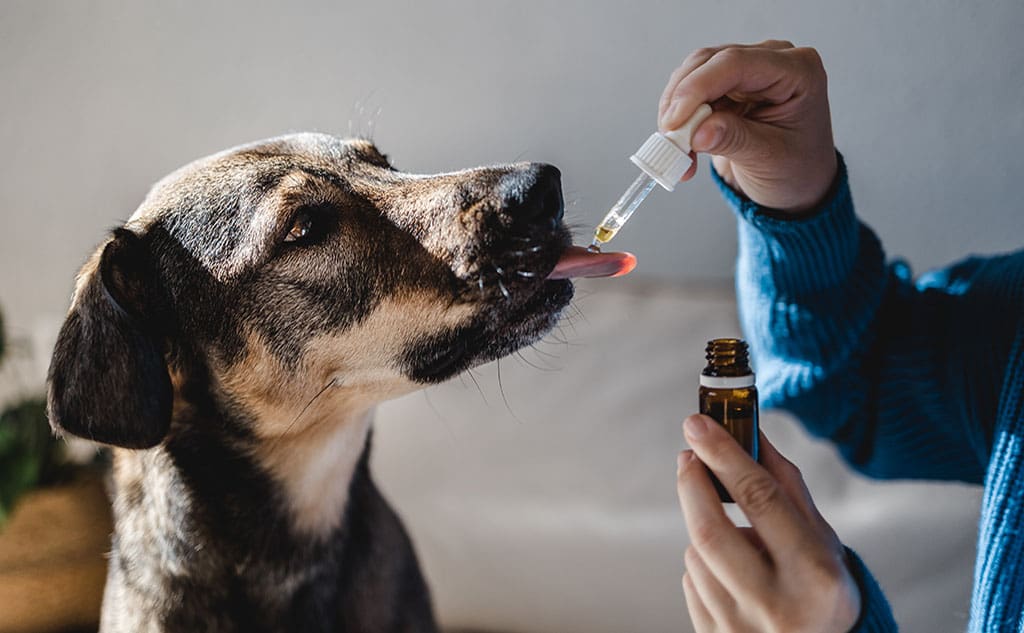In recent years, essential oils have become popular and have gotten pet owners wondering if they are safe for their pets to use. With their perceived therapeutic benefits for humans, many individuals have been eager to do the same for the health and well-being of their pets. However, while essential oils may offer various benefits, it's important to understand that not all essential oils are safe for pets to use.
Whether you're using them for relaxation, repelling insects, or for general health, it's important to learn about the potential risks and safe practices when using these potent substances around your furry companions.
In this article, we'll be exploring the many different ways essential oils can affect pets, which oils are safe, which ones are toxic, and how we can use them responsibly to ensure the safety and comfort of our pets.
How Essential Oils Affect Pets

Essential oils are concentrated plant extracts that contain potent compounds. While we humans are able to metabolise essential oils in ways that may offer health benefits, pets process these oils differently. This difference in metabolism can increase the risk of toxicity when essential oils are used improperly around pets.
Here are some factors that influence a pet's sensitivity to essential oils:
-
Species: Cats and dogs metabolise substances differently, and what may be safe for one species could be harmful for the other.
-
Size: Smaller pets are generally more susceptible to toxic reactions due to their lower body mass.
-
Age and Health Status: Younger pets, older pets, as well as pets with underlying health conditions may have a decreased ability to metabolise essential oils safely.
It's important to keep these varying factors in mind when we're deciding whether to use essential oils in our pet's environment.
Essential Oils that are Generally Safe for Pets

Some essential oils are considered safe when used correctly around pets. These oils tend to be less volatile and have milder effects, making them appropriate for use with animals. Here are a few essential oils that are generally safe for both dogs and cats:
- Lavender: When used in moderation, it is safe for both cats and dogs. It is known for its calming and relaxing properties.
- Frankincense: This oil is considered safe for most pets. Often used for its anti-inflammatory and calming effects.
- Chamomile: Typically safe for cats and dogs, it's a gentle oil used for soothing pets, especially in stressful situations.
-
Rosemary: Can be safe when used in small, diluted amounts. It is often used to boost circulation and relieve anxiety.
Recommended Uses:
- Calming environments (e.g., during thunderstorms).
- Promoting relaxation in stressed pets.
- Supporting immune health (e.g., chamomile for digestive issues).
When using these oils, always remember to dilute them properly, as essential oils are very concentrated.
Essential Oils that are Toxic to Pets
While some oils may benefit pets, there are twice as many that can be harmful or even life-threatening. Cats, in particular, are more sensitive to essential oils due to their lack of certain liver enzymes necessary to metabolise the compounds found in many oils.
This might make you wonder, are essential oils bad for cats? Well yes, some essential oils are toxic to cats and can lead to severe health issues, including liver failure and respiratory distress, or even death.

Here are some essential oils you should avoid if you own a cat:
- Wintergreen
- Sweet Birch
- Citrus Oils (d-limonene)
- Pine
- Ylang Ylang
- Peppermint
- Vanilla (unsafe in large amounts)
- Citronella
Then, what about dogs? While dogs are generally less sensitive to essential oils than cats, some oils can still cause significant health issues.

Here's a list of essential oils to avoid if you own a dog:
- Cinnamon
- Citrus Oils (d-limonene)
- Pennyroyal
- Peppermint
- Pine
- Sweet Birch
- Tea Tree
- Wintergreen
- Ylang Ylang
- Anise
- Close
- Thyme
- Juniper
- Yarrow
- Garlic
Severity of Reactions
The severity of reactions depends on the type of oil, the quantity, and the pet’s size and overall health. For example, even a small amount of tea tree oil can cause a severe toxic reaction in both cats and dogs, while some oils like citrus might cause mild to moderate gastrointestinal distress.
Symptoms of Essential Oil Poisoning in Pets
It's important for pet owners to know the common signs of essential oil poisoning. If you observe your pet exhibiting any of the following symptoms, please seek veterinary care immediately:
- Vomiting or Diarrhea
- Excessive Drooling
- Difficulty in Breathing or Respiratory Distress
- Skin Irritation or Burns
Reconising these signs early on can help to prevent severe toxicity and improve the chances of successful treatment.
What Should I Do if my Pet Shows these Symptoms?
If you suspect your pet has been poisoned by essential oils, it's important to act quickly:
- Remove or Keep your pet away from the source of the oil, be it through a diffuser, applied topically, or ingested.
- Call your Veterinarian if you have one or contact an emergency animal poison control hotline (e.g. ASPCA Animal Poison Control)
- Note down and provide as much information as possible to relevant parties, such as the type of essential oils and the amount used, and the symptoms your pet is exhibiting.
Prompt action can make a significant difference in your pet's recovery.
How to Use Essential Oils Safely around Pets

If you choose to use essential oils around your pets, here are some guidelines to follow:
- Diffusing with Caution: When diffusing oils, ensure that the area is well-ventilated, and your pet can leave the room if they choose to. Limit their exposure time.
- Avoid Direct Skin Contact: Never apply essential oils directly to your pets as undiluted oils can cause irritation or burns
- Keep your Oils Out of Reach: Store essential oils in a safe location to prevent accidental ingestion by your pet.
- Start slowly: Introduce essential oils gradually and monitor your pet's reaction to it over time.
Essential Oils in Pet Products
Some pet products, such as shampoos, sprays, and calming diffusers, contain essential oils. Please make sure to check the ingredients before purchasing these products and make sure that the brands are reputable when it comes to pet-safe oils.
Dos and Don'ts of Using Essential Oils with your Pets
Dos:
Dilute the oils appropriately to ensure that they are safe for your pet
Monitor your pet's reaction especially the first time you are using a new scent
Consult with a veterinarian before using essential oils in case your pet has any pre-existing health conditions
Don'ts:
Don't apply undiluted oils directly to your pets
Don't use toxic oils known to cause harm to your pets
Don't force your pet to inhale or stay in a scented environment as it may cause respiratory issues
Alternatives to Essential Oils for Pet Care
If you're looking for natural alternatives to essential oils, consider herbal remedies like chamomile tea or aloe vera, which can be soothing and are safer when used appropriately. Make sure to always keep up-to-date on, research for alternatives, and discuss them with a veterinarian beforehand.
Understanding which essential oils are safe and which ones you should avoid is crucial for your pet's health and well-being. While essential oils can offer various benefits, it is important to use them responsibly by following proper practices and avoiding toxic oils. By staying informed, you can safely incorporate essential oils into your home while keeping your furry friends safe and comfortable.
For more tips on using essential oils around pets, be sure to visit our store or follow our blog for more advice and updates. Stay safe and enjoy the benefits of nature's oils!



